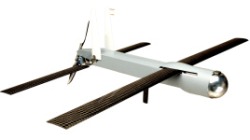Jan 20 2010
BAE Systems, in partnership with the National Oceanic and Atmospheric Administration (NOAA), has completed the first successful test flight of its small, electric-powered Coyote unmanned aircraft system. The system deployed in midair from a 3-foot-long sonobuoy dropped from a P-3 aircraft.
The flight, which lasted 49 minutes, marks a significant milestone in the development of the Coyote for military uses and scientific research.
 The Coyote is a small, electric-powered unmanned aircraft system
The Coyote is a small, electric-powered unmanned aircraft system
“This is a major step forward for this innovative and one-of-a-kind system,” said John Wall, vice president of aviation programs for BAE Systems.
Initially funded by the U.S. Navy, the Coyote weighs only 13 pounds and has a 58-inch wingspan. During freefall, the system is designed to emerge from a sonobuoy, unfold its wings, and begin a directed flight path. Equipped with sensors or cameras, it can perform intelligence, surveillance, and reconnaissance missions while the host aircraft remains in safe airspace.
NOAA funded the test flight, using its WP-3D Orion aircraft, to explore the Coyote’s potential use in weather research. Future testing will assess the system’s suitability to be dropped into a hurricane or tropical storm to measure wind speed and other data critical to forecasting.
“Small unmanned aircraft systems are important tools that can help improve our understanding of the environment,” said Lt. Cmdr. Nancy Ash, NOAA manager for the Coyote project. “The Coyote has demonstrated the potential to provide researchers with valuable observations of high-wind environments.”